Climate Cop-Out?
 One of the most important international conferences on climate change – Conference of the Parties (COP21) to be held in Paris – on December 7-8 is less than a couple of months away and shockingly, Pakistan does not have a minister for climate change. And this, despite the fact that Pakistan has been assessed as one of the top 10 countries vulnerable to climate change. It is a multi-threat country – and no, here one is not talking of India or the Punjabi Taliban!
One of the most important international conferences on climate change – Conference of the Parties (COP21) to be held in Paris – on December 7-8 is less than a couple of months away and shockingly, Pakistan does not have a minister for climate change. And this, despite the fact that Pakistan has been assessed as one of the top 10 countries vulnerable to climate change. It is a multi-threat country – and no, here one is not talking of India or the Punjabi Taliban!
Leading think tanks of the world have placed Pakistan fairly high on the vulnerability index. It faces disasters as varied as floods, due to unpredictable rains, as were witnessed in 2010 and 2011, and from the glacial melt, as seen in Chitral earlier this year.
At the other extreme are the onset of disasters like drought and desertification that are hitting parts of Sindh and Balochistan, and the spectre of inundation of coastal areas due to a rise in the sea level that will exacerbate the already dire situation being faced due to the intrusion of the sea in certain districts of Sindh.
Add to this mix the unpredictability of the monsoons, and the level of vulnerability of an agricultural country like Pakistan increases manifold. Then there are the ‘non-traditional’ climate change events, as listed by Dr. Pervaiz Amir, agro-economist and climate change expert, who drew the Planning Commission’s attention to them. They include heat waves, hailstorms sandstorms and duststorms; tornadoes, fog, landslides, Glacial Lake Outburst Floods (GLOF), and wildfires.
Does Pakistan have the resources to tackle all or even some of these climate change eventualities? The answer is a resounding no. Does Pakistan have the human resources or the capacity to deal with them? The answer to that is, yes… but!
It is this ‘but’ that is the reason why Pakistan finds itself lagging way behind single threat countries like the Maldives or Bangladesh (which are threatened by the rise in sea levels), in presenting its case forcefully before the world.
Qualified people need to be appointed at decision-making levels, and then they need the backing of people at the helm – the main decision makers – which unfortunately has not been the case. We have scientists, planners, environmental experts; even research bodies who have more or less mapped out the threats, as well as the measures needed to cope with them.
There is a growing realisation that despite the devolution of the environment sector to the provinces post the 18th Amendment, matters relating to environment and climate change need to be taken cognizance of and addressed at the national level. Policy and legislation must be complementary to the needs of Pakistan.
So where will COP21 figure in Pakistan’s scheme of things? COP is an annual meeting to review the response to the UN Framework Convention on Climate Change (UNFCCC) that was put together in Rio in 1995. Subsequent milestones include COP3, where the Kyoto Protocol was signed that put a cap on emissions. Unfortunately, the biggest polluters – China, India, USA – did not sign it.
Since then, each successive COP has seen this push and pull between what the polluters need to do to stop global warming, and what the affected need to do to deal with a problem which is not of their making. Along the way, certain concrete measures like creating a Green Climate Fund were taken.
Now, most of the nay sayers have been convinced, and those offering the stiffest resistance to reform, namely the US, China and India, are willing to take mitigating action. Also, there is money in the kitty to help the affected countries to cope.
Where does Pakistan figure in all of this?
 Not nearly as out there in the centre as it used to be. This is the lament of some of those who had been a part of the deliberations over the years. COP21 is about cutting emissions to keep global temperature increase below two degrees centigrade. The commitments, in the shape of Intended Nationally Determined Contributions (INDCs) for emission cuts post-2020 that have so far been submitted to the UNFCCC secretariat, indicate that this is not going to be the case. Some countries have refused to take any new action, to mitigate the problem. For them, it will be business as usual.
Not nearly as out there in the centre as it used to be. This is the lament of some of those who had been a part of the deliberations over the years. COP21 is about cutting emissions to keep global temperature increase below two degrees centigrade. The commitments, in the shape of Intended Nationally Determined Contributions (INDCs) for emission cuts post-2020 that have so far been submitted to the UNFCCC secretariat, indicate that this is not going to be the case. Some countries have refused to take any new action, to mitigate the problem. For them, it will be business as usual.
Even the highest officials have expressed pessimism about achieving the desired emission cuts to contain temperatures and this conference may end up being another cop-out which dashes the hopes of environmentalists across the world and leads to a blame game and finger-pointing at those countries whose commitments fall short of what is needed.
Pakistan is aligned with the Group of 77 and China, comprising mostly developing nations. Initially China, as a nation careering towards development, was one of the leading polluters in the world. Now it is seen as a country serious in emission reductions.
In the global context, Pakistan’s emissions are a miniscule 0.8%. The breakdown, sectorwise, is as follows: transport and energy (51%), industry (5.8%), waste (1.8%), agriculture (39%) and forestry (2.9%). Since the Paris COP21 is all about commitments to cuts in emissions, Pakistan will be making its declaration of intent, and also highlighting some voluntary measures it has taken towards mitigation, adaptation, institution-building and knowledge-management. Naturally, it will be looking to get a piece of the pie from the Green Climate Fund to assist in taking adaptation measures.
Pakistan has already declared its intent to submit a proposal to obtain readiness support from the Fund by October. This will mostly be used to enhance the capacity of its Ministry of Climate Change, and kick-start many low-emission and climate-resilient initiatives, including those for renewable energy. Pakistan is also looking for funding for adaptation measures, like the one undertaken in Gilgit-Baltistan and Chitral to cope with GLOF. This project was credited with saving lives and minimising damage when the glacial burst occurred in Bagrot Valley in Gilgit.
While it is all very well to wave the victim card, Pakistan’s hopes from COP21 are not something to write home about. Yes, we have done some remarkable work at the policy level. There are adaptation success stories dotting the country, but the bigger picture shows many gaps. Pakistan needs continuity of policy and skill-development of the human resource that represents the country at these key negotiations. Many countries are represented by their presidents and prime ministers, with legal and diplomatic aides in tow. Not so, with Pakistan.
The musical chairs played at the bureaucratic and political level is what deprives Pakistan of the advantage which countries like Bangladesh and Maldives are able to gain. Two years ago, at COP19, Pakistan was represented by the minister of state for railways! This time, a few months short of the important conference, the Minister of Environment, Mushahidullah, was forced to resign for making a statement against a former ISI chief. As these lines go into print, the Ministry of Climate Change is without a minister.
This is yet another tragedy for this beleaguered country. As former Pakistan ambassador Shafqat Kakakhel, who has been part of the COP negotiating team in the past said:
“The forthcoming climate change conference in Paris is extremely important for every one, but more so for the poor who lack the resilience to cope with calamities of all types, including the by now well-known impacts of climate change such as floods, droughts, less food and water, and inundation of coastal areas and small island states.”
Newsline put two basic questions to four of Pakistan’s leading
experts on environment.Q. 1: What will Pakistan take to Paris?
Q. 2: What does it hope to come away with?
“Pakistan is one of the most impacted and vulnerable countries of the world in relation to climate change, though it remains one of the lowest contributors to the global problem with just 0.08% of the green house gas emissions. We can truly be termed a victim of climate injustice. Our case at COP21 is also premised on this stark reality. We must focus on our needs for adaptation and climate finance, while also elaborating on the considerable voluntary steps Pakistan has taken, such as Khyber Pakhtunkhwa’s voluntary commitment of targeting zero carbon economic growth through clean hydro-energy as well as afforestation. Also noteworthy is the Quaid-e-Azam solar park development scheme, with 100 MW already installed and 900 MW in the pipeline.”
“Pakistan hopes to establish its extreme climate vulnerability on the global stage, while seeking new avenues for climate finance for both mitigation and adaptation. Pakistan’s financial needs to cope with the forced impacts of climate change are estimated at between US$ 6-14 billion year, while for climate mitigation it needs between US$ 9-17 billion worth of investment to shift its future growth trajectory onto a cleaner and low-carbon pathway. We do not have the luxury of time on our side, and the world needs to understand that Pakistan, like other developing countries, has to be wary of the demands for voluntary cuts and ensure that our future development does not, in any way, become a hostage to emission limitations as is premised by the founding principles of the UNFCCC – namely the ‘polluter pays’ and the ‘common but differentiated responsibility’ principles.”
— Malik Mohammad Amin Aslam, former minister of state for environment, IUCN global vice president, and author of the green growth strategy of the Khyber Pakhtunkhwa government, which includes the ambitious billion-tree plantation programme.
“Pakistan must provide a clear statement that if no action is taken to curb CO2 emissions and restrict temperature rise, non-traditional impacts will cause colossal loss. The recent Karachi heat wave is an example.”
“Pakistan is energy-hungry, we need international help in green technologies with low carbon emissions. If not, we are poised to join the coal-fired plant club. We are the frontline state in two wars: climate change and terror. Climate change decisions cannot be deferred. Our way forward is water, renewable energy and a greener Pakistan.”
— Dr Pervaiz Amir, agro-economist and former member of the Prime Minister’s Task Force on Climate Change.
“Pakistan’s policy-makers need to understand that the Paris 2015 Conference is a defining moment, with respect to medium-and long-term economic growth and social development objectives of Pakistan. Sustainable, climate-resilient and inclusive development is the only viable way forward for Pakistan and we must be well-prepared for a meaningful participation in the conference. The agenda and scope of the Paris Conference contains many elements which are of particular importance to Pakistan. In the framework of existing and evolving mechanisms of adaptation to climate change, international climate finance, technology transfer and the Warsaw mechanism of loss damage, the case of Pakistan’s exposure to climatic threats should be compellingly and convincingly presented.”
“Pakistan has enormous potential for reducing emissions in a cost-effective manner. Similarly, adapting to the harmful impacts of climate change has become a necessity for a large segment of our population. We are at the stage of forced adaptation, and we should highlight this fact before the global community. Our meaningful participation is critically important in the loss-and-damage mechanism, which within Pakistan’s perspective, is a multi-dimensional issue.”
— Bilal Anwar, a climate policy expert, who has worked at the UNFCCC Secretariat.
“Unfortunately, Pakistan is no longer a consequential player in international climate change negotiations. We dropped the ball. Pakistan put climate change on the back-burner and now climate change negotiations have put Pakistan on the back-burner. This is unfortunate because in 1992, and for many years after that, we were a consequential player. It is also unfortunate because we still have many talented professionals who could make Pakistan a consequential player.”
“Pakistan will not take much to the table at Paris. We are likely to bring back even less. This is a great loss to Pakistan’s own very pressing climate change challenges. But it is also a loss to Pakistan’s foreign policy because we will, once again, be on the sidelines at a negotiation that the most important powers of the world are now taking very seriously – USA, EU, China – and where we could well have been an actor of consequence.”
— Dr Adil Najam, former dean of LUMS and now dean of the Pardee School in Boston University. He is also the lead author of the UNFCCC report on Climate Change in 2007 that won the organisation the Nobel Peace Prize, along with Al Gore.
This is the view of the Pakistan Government’s representatives on climate change and COP21.
“Pakistan has taken many measures to voluntarily cut emissions. The fact that we have still kept the coal underground should be appreciated, especially as the country is facing a serious energy crunch. There is a development policy vision 2025 that is taking cognizance of the green development imperatives. We also have the Climate Technology Centre and Network (CTCN) going, even though it is in the initial stages. We are also one of the few countries which has the Initial National Communication process in place after a multi-stakeholder, inter-ministerial dialogue.
“Pakistan also plans on holding a side event at COP21, where we will be focusing on the policy and institutional mechanisms that have been developed to cope with climate change. The Benazir Income Support Programme (BISP) came into being as a disaster management mechanism and as a social safety net. We need to come up with more bankable, saleable projects in the field of energy, agriculture and waste management to show climate compatible development initiatives.”
— Irfan Tariq, the Director General Environment in the Ministry of Climate Change.
“COP21 will be a weak deal if there are no binding mechanisms to enforce emission targets and, at best, it will be a course correction for 2020 when the targets and their effects will be assessed. Pakistan has taken voluntary measures at emission reductions despite being a negligible emitter. The Bahawalpur solar power is one such step towards energy efficiency, development of renewable energy resources, and Reducing Emissions from Deforestation and Forest Degradation (REDD) is an example. We can manage a 5% reduction but can go up to 10-20% by 2030 if climate financing is provided.
“Pakistan has also embarked on a technology needs assessment, though that is still in its infancy and may not yield much benefit in Paris. In the future, climate financing will become more clear as the Green Climate Fund is making good progress. Pakistan is seeking 6-7 million dollars, for its GLOF II project. Other financial mechanisms, like the Asian Development Bank’s support against vulnerability through its Disaster Response Management Fund can feed into NDMA for rehabilitation recovery and climate insurance. This is a totally new field that needs attention. “
— Dr Qamruzzaman Chaudhury, former Director General Met and author of Pakistan’s Climate Change Policy.
This article was originally published in Newsline’s October 2015 issue.
http://www.newslinemagazine.com/2015/10/climate-cop-out/

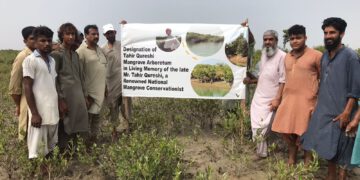
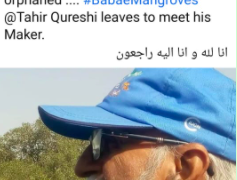
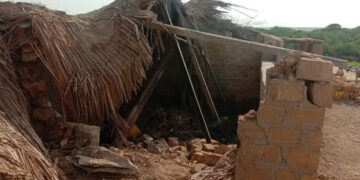
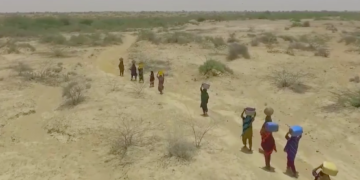


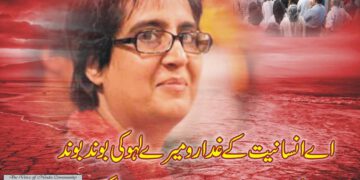





Reblogged this on Green Living 4 Live.